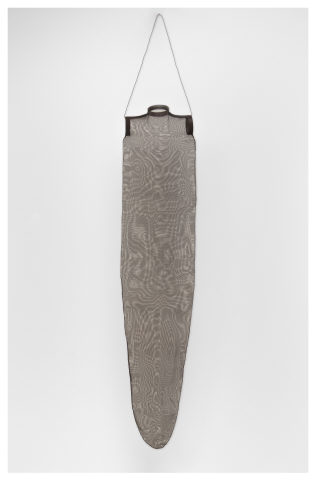
- 1994
- Iron
- Painted iron
- Inv. 95E355
Rui Chafes
Würzburg Bolton Landing I
This suspended sculpture, the upper part suggesting the shoulders and neck of a human body, was wrought by Rui Chafes from iron mesh, his material of choice and one of his artistic hallmarks.
This mesh, seen here as a kind of body bag, evokes the image of skin as a wrapping that restrains the body, yet with a transparency that allows the light to pass through it. This interpenetration is intensified by a series of dichotomies – heaviness and lightness, high and low, hard and soft, interior and exterior, empty and full – which emphasise the essence of the work: the transformation of a substance as heavy and coarse as iron into something organic and fragile, with a shape that hints at sexuality as something at once liberating yet conditioning. Chafes always paints the iron, obliterating it as a substance. As he explains, «in my work I’m searching for forms that will act like the letters in writing.Iron is always made black or grey so that it becomes unobtrusive.»* Iron, which is worked upon with fire, the same fire which burns, incinerates and conjures up an image where the figures of the alchemist and the blacksmith merge into one, just as this sculpture somehow fuses the gothic with the contemporary.
The aforementioned analogy to writing is all the more important when we learn that the artist is also a writer and translator (principally of Novalis’ Fragments), and has published several books in which German romanticism and the aesthetics of the sublime are claimed as personal ideals.
Indeed, the title of this sculpture, which is also the title of one of his books, an anthology of texts esteemed by the artist, acts as a paradigm for this idea: Wurzburg was the city where Tilman Riemanschneider, a medieval German artist, and Chafes’ favourite, lived and worked, and eventually became burgomaster; Bolton Landing is a huge tract of land in New York where the American sculptor David Smith, an abstract expressionist, built his study.
We are also looking at a kind of personal topography, a title which identifies the artistic geography of Chafes himself, and yet another key to understanding this melancholic sculpture; again in his own words: «I want to create points that are dull, opaque and rough, offering no smoothness or light relief. I want to push away this digital, multi-coloured, transparent, slippery world. That is, I’m trying to establish a strategy of slowness to counteract a strategy of acceleration; a strategy of heaviness to counteract a strategy of lightness.»**
Isabel Carlos
May 2010
* Cf. interview with Rui Chafes by Doris von Drathen in Rui Chafes: Um Sopro, Porto, Galeria Graça Brandão, 2003.
** Idem.
| Type | Value | Unit | Section |
| Height | 230 | cm | |
| Depth | 12 | cm | |
| Width | 33 | cm |
| Type | Donation |
| Linhas de Sombra |
| Lisboa, Fundação Calouste Gulbenkian e Centro de Arte Moderna, 1999 |
| ISBN:972-635-115-4 |
| Catálogo de exposição |
| Prémio de Artes Plásticas União Latina 1996 |
| Lisboa, Fundação Calouste Gulbenkian / União Latina, 1997 |
| Catálogo |
| Harmonia |
| Porto, Canvas & Companhia, 1998 |
| Monografia |
| Würzburg Bolton Landing |
| Lisboa, Assírio & Alvim, 2005 |
| Monografia |
| Rui Chafes |
| Lisboa, Editorial Caminho, 2006 |
| Monografia |
| Desenhos e esculturas do CAMJAP |
| Câmara Municipal de Porto de Mós |
| Curator: CAMJAP/FCG |
| 8 de Julho de 2005 a 28 de Julho de 2005 Castelo de Porto de Mós |
| Esta exposição enquadra-se nas comemorações dos 700 anos do Foral da Vila de Porto de Mós - 8 a 28 JUL 2005 |
| A Partir da Colecção |
| CAMJAP/FCG |
| Curator: CAMJAP/FCG |
| 25 Julho de 2006 a 29 Abril de 2007 Museu do CAMJAP - Piso 01 |
| Comissariado: Jorge Molder e Leonor Nazaré |
| Exposição Permanente do CAM |
| CAM/FCG |
| Curator: Jorge Molder |
| 18 de Julho de 2008 a 4 de Janeiro de 2009 Centro de Arte Moderna |
| Exposição Permanente entre 18 de Julho de 2008 a 4 de Janeiro de 2009. |
| Linhas de Sombra |
| Fundação Calouste Gulbenkian |
| Curator: Fundação Calouste Gulbenkian |
| 29 de Janeiro de 1999 a 18 de Abril de 1999 Lisboa |
| Exposição comissariada por João Miguel Fernandes e Maria Helena de Freitas e programada por Jorge Molder e Rui Sanches. |
| Würzburg Bolton Landing |
| CAM/FCG |
| Curator: CAM/FCG |
| 1995 a 1995 Centro de Arte Moderna, Lisboa |
| 7 esculturas em ferro, Centro de Arte Moderna José de Azeredo Perdigão Fundação Calouste Gulbenkian. |
| Prémio de Artes Plásticas União Latina 1996 |
| Fundação Calouste Gulbenkian |
| Curator: União Latina |